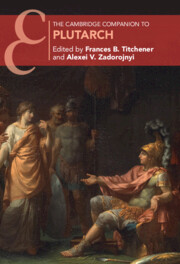Book contents
- The Cambridge Companion to Plutarch
- The Cambridge Companion to Plutarch
- Copyright page
- Contents
- Figures
- Contributors
- Acknowledgments
- Introduction
- Chapter 1 Plutarch and Biography
- Chapter 2 Romanness and Greekness in Plutarch
- Chapter 3 Plutarch As Moral and Political Educator
- Chapter 4 In the Spirit of Plato
- Chapter 5 Plutarch As a Polemicist
- Chapter 6 Religion and Myth in Plutarch
- Chapter 7 Plutarch at the Symposium
- Chapter 8 Language, Style, and Rhetoric
- Chapter 9 Plutarch and Classical Greece
- Chapter 10 Great Men
- Chapter 11 Thinking “Private Life”
- Chapter 12 Wealth and Decadence in Plutarch’s Lives
- Chapter 13 Plutarch and the Barbarian “Other”
- Chapter 14 Plutarch and Animals
- Chapter 15 Plutarch in Byzantium
- Chapter 16 Plutarch in the Italian Renaissance
- Chapter 17 Plutarch and the Spanish Renaissance
- Chapter 18 Plutarch and Shakespeare
- Chapter 19 Plutarch in France
- Bibliography
- Appendix: Plutarch’s Moralia
- Index Locorum
- Index
- Cambridge Companions To …
Chapter 15 - Plutarch in Byzantium
Published online by Cambridge University Press: 29 June 2023
- The Cambridge Companion to Plutarch
- The Cambridge Companion to Plutarch
- Copyright page
- Contents
- Figures
- Contributors
- Acknowledgments
- Introduction
- Chapter 1 Plutarch and Biography
- Chapter 2 Romanness and Greekness in Plutarch
- Chapter 3 Plutarch As Moral and Political Educator
- Chapter 4 In the Spirit of Plato
- Chapter 5 Plutarch As a Polemicist
- Chapter 6 Religion and Myth in Plutarch
- Chapter 7 Plutarch at the Symposium
- Chapter 8 Language, Style, and Rhetoric
- Chapter 9 Plutarch and Classical Greece
- Chapter 10 Great Men
- Chapter 11 Thinking “Private Life”
- Chapter 12 Wealth and Decadence in Plutarch’s Lives
- Chapter 13 Plutarch and the Barbarian “Other”
- Chapter 14 Plutarch and Animals
- Chapter 15 Plutarch in Byzantium
- Chapter 16 Plutarch in the Italian Renaissance
- Chapter 17 Plutarch and the Spanish Renaissance
- Chapter 18 Plutarch and Shakespeare
- Chapter 19 Plutarch in France
- Bibliography
- Appendix: Plutarch’s Moralia
- Index Locorum
- Index
- Cambridge Companions To …
Summary
This chapter examines the transmission of Plutarch’s works from late antiquity to the fourteenth century and then looks at some striking examples of his appropriation. Although in the early centuries of this period over half his works were lost, a key factor ensuring the survival of the rest was the fact that their moral outlook was so compatible with that of orthodox Christianity. The watershed moment comes in the thirteenth century when Maximus Planudes devoted himself to collecting and copying the still existing works. Among the examples provided here to show his works were being closely read are the use Photius makes of them in his Bibliotheca; the influence of the structure and purpose of the Lives on the scholars at the court of Constantine VII Porphyrogenitos and later on Michael Psellos; Anna Komnena’s knowledge of various Moralia treatises; and Theodorus Metochites’ self-fashioning as an early-fourteenth-century Plutarch.
- Type
- Chapter
- Information
- The Cambridge Companion to Plutarch , pp. 303 - 322Publisher: Cambridge University PressPrint publication year: 2023

